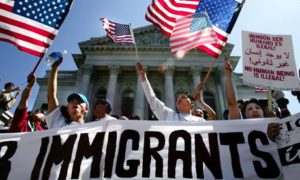Migration in the US – a tale of two ideologies
The stark differences between the Republican and Democrat parties over migration were laid bare during the US primaries.
But the issues at stake were brought into sharper focus this week when it became increasingly likely that the Obama administration will hit its goal of admitting 10,000 Syrian refugees into the US before the end of September.
State Department figures show that 2,340 Syrian refugees arrived last month in the US.
That is a larger number than arrived during the entire seven months after President Barack Obama directed his administration to prepare for 10,000 admissions from the war-torn country.
Total admissions for the current budget year, which ends September 30, now total about 7,900 and the vast majority of them are Sunni Muslims, records show.
But the issue of migration is a polarising one in the US and could be a key in the outcome of the November 8 general election.
 The Republican Party’s policy on migration is based on heightened concerns about border and national security, perceived weak enforcement of immigration laws, and high levels of legal immigration.
The Republican Party’s policy on migration is based on heightened concerns about border and national security, perceived weak enforcement of immigration laws, and high levels of legal immigration.
The Democrats’ platform focuses on increased rights and protections for the unauthorised population and recent flows of Central Americans, as well as immigrant integration.
In many ways, the fundamentally divergent policies are further evidence of how the two parties now exist in parallel universes on a number of issues.
The Republican policy contains two central tenets embraced by presidential nominee Donald Trump since he made immigration a centerpiece of his campaign: building a wall on the southern border and screening immigrants from certain countries or with certain religious affiliations.
This year’s platform calls for walling off the entire 2,000-mile border, in contrast with the 2012 version which advocated finishing the double-layered fencing mandated along certain sections of the border under the Secure Fence Act of 2006.
While the platform mirrors the Trump vow to build a wall along the entire US-Mexico border, the document attempts to take a more nuanced and practical stance than the candidate’s recommended ban on admission of all Muslims or all individuals from regions with proven histories of terrorism.
Instead, the platform advocates “special scrutiny” for foreign nationals seeking admission from terror-sponsoring countries or “regions associated with Islamic terrorism.”
The policy also resurrects the traditional fare of prior blueprints, but with a sprinkling of the more hard-edged rhetoric common today. These include preventing states from issuing licenses to unauthorised immigrants, mandatory five-year prison sentences for illegal re-entry, penalising states and localities that are commonly known as “sanctuary cities,” and recognising the role of states in immigration enforcement.
The Democrat platform reflects key concerns of its core constituencies; it focuses on expansion of rights for unauthorised immigrants living in the US and recently arrived children and families from Central America.
Calling for an “urgent” fix of the “broken immigration system,” the policy endorses a path to citizenship for law-abiding unauthorised immigrants.
It also talks of the party’s commitment to defend and implement the Deferred Action for Parents of Americans and Lawful Permanent Residents (DAPA) program and expansion of the Deferred Action for Childhood Arrivals (DACA) program, both of which were sidelined by the Supreme Court.
Hillary Clinton’s campaign promise is that a government led by her will support expanding the Obama administration executive actions to others, including parents of DREAMers.
DREAMers refers to the The DREAM Act, an acronym for Development, Relief, and Education for Alien Minors, a legislative proposal for a multi-phase process for undocumented immigrants in the US that would first grant conditional residency and permanent residency upon meeting further qualifications.
It also advocates that DREAMers be eligible for driver’s licenses, in-state tuition, military service, and an expedited pathway to citizenship.
The Democratic platform also focuses on Central American migration, an issue of special concern due to recent increases in the arrivals of unaccompanied children and families at the US-Mexico border.
The document advocates a number of protective measures, some of which potentially would go further than the current administration’s actions: working with regional partners to address the root causes of violence in Central America, in-country and third-country refugee and parole processing, and expanding the use of humanitarian parole and Temporary Protected Status (TPS).
The Democratic platform also calls for an end to “raids and roundups” of families and children, and seeks to abolish the use of private prisons and detention centres for immigrant detainees.
Laurie Nowell
AMES Australia Senior Journalist












